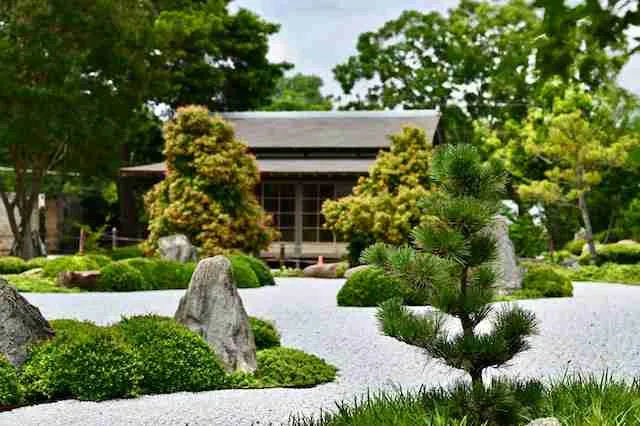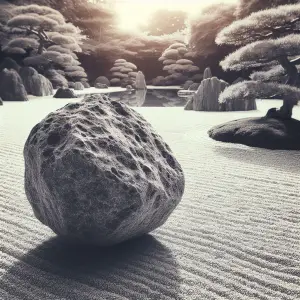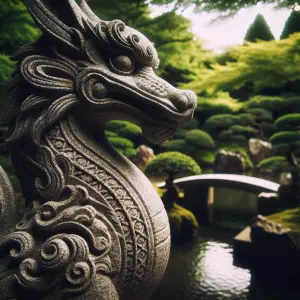If you’re seeking tranquility and peace, you may be curious about famous Zen gardens in the United States. These serene spaces are designed to help you find your inner calm amidst the hustle and bustle of everyday life.
From the breathtaking beauty of the Portland Japanese Garden in Oregon to the mesmerizing simplicity of the Zen Rock Garden at the Ryoanji Temple in Kentucky, America is home to several renowned Zen gardens that offer a glimpse into the art of meditation and mindfulness.
Step into these green havens and let the soothing sounds of flowing water and the meticulous arrangement of rocks transport you to a place of inner serenity.
Understanding Zen Gardens
Definition of Zen Gardens
Zen gardens, also known as Japanese rock gardens or dry landscapes, are meditative spaces designed to promote tranquility and spiritual reflection. These gardens are characterized by their minimalist and symbolic elements, consisting of carefully arranged rocks, gravel or sand, moss, and occasionally, vegetation.
Zen gardens often incorporate elements such as water features, bridges, lanterns, and statues, all carefully chosen and positioned to create a harmonious and peaceful atmosphere.
Origins of Zen Gardens
Zen gardens have their roots in Zen Buddhism, which originated in China and later spread to Japan. The practice of creating and appreciating these gardens became popular during the Muromachi period (1336-1573) in Japan, when Zen Buddhism flourished.
The design principles of Zen gardens were heavily influenced by the philosophy of Zen Buddhism, which emphasizes simplicity, mindfulness, and the beauty of imperfection.
Purpose and Benefits of Zen Gardens
Zen gardens serve multiple purposes and offer numerous benefits to those who engage with them. The primary aim of these gardens is to provide a serene space for meditation and contemplation. The minimalist design helps to clear the mind and cultivate a sense of tranquility and mindfulness. The repetitive patterns or raked gravel and the smoothness of stones invite a sense of calm and allow visitors to focus on the present moment. Additionally, Zen gardens can inspire creativity, spark insight, and foster a deeper connection with nature.
Pacific Zen Institute Meditation Garden (Santa Rosa, California)
The Location and History
The Pacific Zen Institute Meditation Garden is situated in the picturesque city of Santa Rosa, California. Nestled amidst the stunning landscape of Sonoma County, this Zen garden offers a serene escape away from the bustling city life. Established in 2004 by the Pacific Zen Institute, the garden was designed as a sacred space for meditation and spiritual practice. The Institute, founded by John Tarrant, a renowned Zen teacher, aims to provide teachings and support for those on the path of Zen Buddhism.
Unique Features and Design
The Pacific Zen Institute Meditation Garden boasts a harmonious fusion of Japanese and Californian aesthetics. The garden features a meticulously raked gravel area, symbolic boulders, and carefully placed rocks. A tranquil pond adorned with water lilies adds a touch of serenity to the landscape. The garden also incorporates lush greenery, including native Californian plants and vibrant flowers, which enhance the overall beauty and create a sense of balance in the space.
Tourism and Local Relevance
The Pacific Zen Institute Meditation Garden attracts visitors from both near and far, seeking a peaceful retreat and a space for self-reflection. Locals and tourists alike come to explore the garden, participate in meditation workshops, and learn about the teachings of Zen Buddhism. The garden’s serene ambiance and breathtaking setting amidst Sonoma County’s natural beauty make it a favorite destination for those yearning to reconnect with nature and find inner peace.
Zuiho-In (Kyoto Garden, Los Angeles)
The Location and History
Zuiho-In, also known as the Kyoto Garden, is a hidden gem nestled within the bustling city of Los Angeles. Located in the neighborhood of Boyle Heights, this Zen garden offers a tranquil haven within an urban landscape. The garden was created in 1969, as a gift from the city of Los Angeles’ sister city, Nagoya, Japan. Zuiho-In is maintained by the Los Angeles City Department of Recreation and Parks, promoting the appreciation of Japanese culture and Zen spirituality.
Unique Features and Design
The Zuiho-In Zen garden embodies the essence of traditional Japanese aesthetics. The garden is designed around a central pond, teeming with colorful koi fish. A meticulously manicured dry landscape, featuring rocks, gravel, and carefully placed stones, surrounds the pond. The garden also showcases a tea house, where visitors can engage in traditional tea ceremonies and experience the meditative ritual of drinking matcha tea.
Tourism and Local Relevance
Zuiho-In’s breathtaking beauty and tranquil atmosphere have made it a beloved destination for locals and tourists seeking solace amidst the city’s hustle and bustle. Visitors can immerse themselves in the art of Japanese tea ceremonies, learn about Zen Buddhism through guided tours, and participate in meditation sessions. The garden’s cultural significance and its role in promoting cross-cultural understanding make it a cherished landmark within the Los Angeles community.
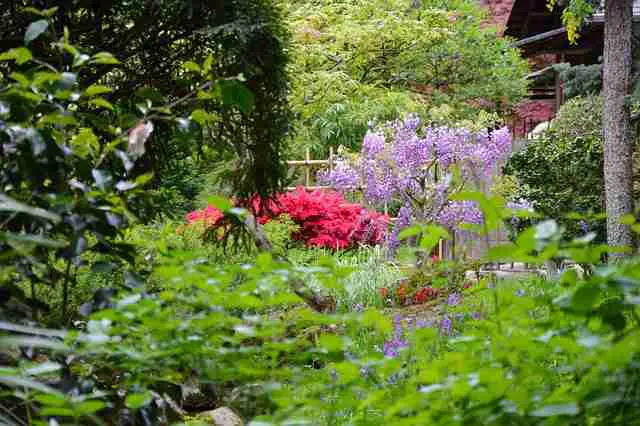
Anderson Japanese Gardens (Rockford, Illinois)
The Location and History
Nestled within the heart of Rockford, Illinois, Anderson Japanese Gardens is a breathtaking oasis of serenity. Established in 1978, this ten-acre garden was the vision of John R. Anderson, a successful businessman with a profound appreciation for Japanese culture. Anderson collaborated with renowned Japanese landscape architect Hoichi Kurisu to create a garden that would embody the principles of Zen aesthetics.
Unique Features and Design
Anderson Japanese Gardens seamlessly blends traditional Japanese landscaping techniques with the natural beauty of the Midwest. The garden features a winding path that leads visitors through meticulously manicured landscapes, flowing waterfalls, and serene ponds. It boasts a variety of plant species, including Japanese maples, conifers, and vibrant flowers that provide bursts of color throughout the seasons. Zen-inspired architectural elements, such as pagodas, bridges, and stone lanterns, further enhance the garden’s visual appeal.
Tourism and Local Relevance
Anderson Japanese Gardens has become a beloved tourist destination, attracting visitors from across the nation and abroad. The garden offers a peaceful retreat for those seeking respite from the demands of daily life. In addition to strolling through the garden’s stunning landscapes, visitors can participate in meditative yoga classes, attend cultural events, and immerse themselves in the art and traditions of Japan. Anderson Japanese Gardens has not only brought a touch of Zen to Rockford but has also contributed to the local economy and cultural enrichment.
Portland Japanese Garden (Portland, Oregon)
The Location and History
Enveloped by the natural beauty of Portland, Oregon’s Washington Park, the Portland Japanese Garden has captivated visitors since its inception in 1963. Influenced by the gardens of Kyoto, the garden was designed by renowned Japanese garden designer Takuma Tono and architect Peter Dammann. Their vision was to create an authentic Japanese garden that would serve as a place of tranquility and cultural exchange.
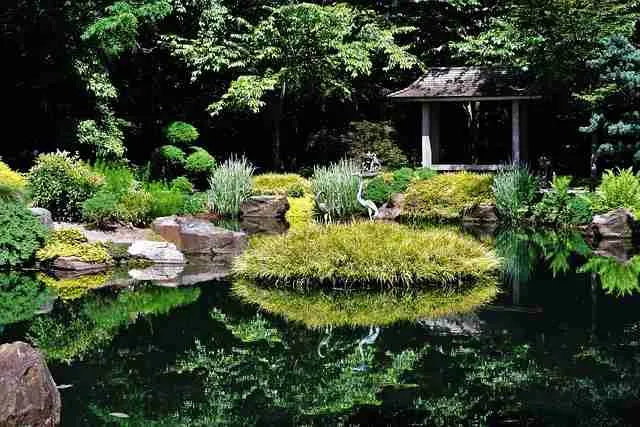
Unique Features and Design
The Portland Japanese Garden is a masterpiece of meticulous design and horticultural expertise. The garden is divided into several distinct areas, each representing a different aspect of traditional Japanese garden aesthetics. Visitors can explore the Strolling Pond Garden, the Tea Garden, the Natural Garden, and the Sand and Stone Garden, among others. Each area showcases carefully placed stones, flowing water, vibrant flora, and architectural elements that evoke a sense of harmony and balance.
Tourism and Local Relevance
The Portland Japanese Garden stands as a testament to the city’s commitment to cultural diversity and appreciation. The garden attracts tourists from around the world, drawn to the serene landscapes and the opportunity to immerse themselves in Japanese art, music, and tea ceremonies. The garden also hosts seasonal events, such as cherry blossom festivals and traditional Japanese ceremonies, strengthening the bond between Portland’s local community and the broader world of Japanese culture.
Golden Gate Park Japanese Tea Garden (San Francisco, California)
The Location and History
Nestled within San Francisco’s iconic Golden Gate Park, the Japanese Tea Garden has been an integral part of the city’s cultural landscape for over a century. Originally created as a temporary exhibit for the 1894 California Midwinter International Exposition, the garden’s enchanting beauty captivated visitors and led to its preservation as a permanent attraction.
Unique Features and Design
The Golden Gate Park Japanese Tea Garden embodies the elegance and tranquility of traditional Japanese gardens. The garden features lush greenery, vibrant azaleas, and the signature Japanese maple trees, which turn into a blaze of red and orange during the autumn months. Serene koi ponds, arched bridges, and pagodas add to the garden’s allure, while a traditional teahouse invites visitors to experience the ancient rituals of tea ceremonies.
Tourism and Local Relevance
The Golden Gate Park Japanese Tea Garden is a beloved destination for locals and tourists alike. Visitors can enjoy a peaceful stroll through the expertly crafted landscapes, partake in traditional tea ceremonies, and savor authentic Japanese cuisine. The garden’s close proximity to other attractions within Golden Gate Park, such as the de Young Museum and the San Francisco Botanical Garden, makes it a must-visit destination for those seeking solace and cultural immersion in the heart of San Francisco.
Morikami Museum and Japanese Gardens (Delray Beach, Florida)
The Location and History
Nestled in the vibrant city of Delray Beach, Florida, the Morikami Museum and Japanese Gardens stands as a testament to the bond between Japanese and Floridian culture. Established in 1977, the museum and gardens were a gift from the Japanese government to the United States as a gesture of friendship.
The museum’s name pays homage to George Sukeji Morikami, a farmer instrumental in establishing the Yamato Colony, a pioneering Japanese farming community in South Florida.
Unique Features and Design
The Morikami Museum and Japanese Gardens transport visitors to the tranquil landscapes of Japan. The garden comprises six unique gardens, each meticulously designed to reflect different periods and styles of Japanese gardening.
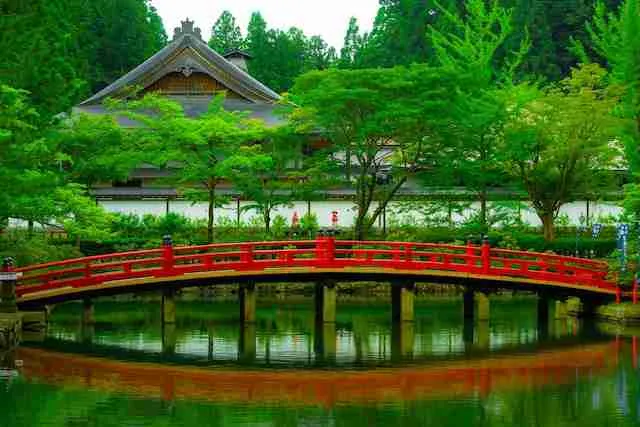
Visitors can explore the Modern Romantic Garden, the Paradise Garden, and the Karesansui Garden, among others. The garden features striking rock formations, meticulously pruned trees and shrubs, serene water features, and vibrant flora, all evoking a sense of serenity and harmony.
Tourism and Local Relevance
The Morikami Museum and Japanese Gardens have become a cultural hub and a beloved destination for both locals and visitors. The museum offers exhibitions on Japanese art and history, while the gardens provide a peaceful retreat for meditation and contemplation. The community surrounding the museum actively participates in Japanese cultural events and festivals, strengthening the connection between Delray Beach and Japan. The Morikami Museum and Japanese Gardens have not only enriched the local cultural scene but have also fostered cross-cultural understanding and appreciation.
Denver Botanic Gardens (Denver, Colorado)
The Location and History
Nestled in the heart of Denver, Colorado, the Denver Botanic Gardens has been a sanctuary of natural beauty and tranquility since its establishment in 1951. The Gardens’ Japanese garden, known as the Shofu-en garden, was designed by renowned landscape architect Koichi Kawana. The garden was conceptualized as a place of refuge, offering respite from the demands of urban life.
Unique Features and Design
The Shofu-en garden within the Denver Botanic Gardens combines traditional Japanese landscaping techniques with the natural topography of Colorado. The garden is comprised of five distinct areas, each representing a different aspect of Japanese garden aesthetics. Visitors can explore the Strolling Garden, the Tea Garden, the Shinden Garden, and the Water Garden, all of which feature meticulously placed rocks, flowing water, unique architecture, and colorful flora.
Tourism and Local Relevance
The Denver Botanic Gardens, and specifically the Shofu-en garden, have become a popular attraction for nature enthusiasts and seekers of inner peace. The garden’s serene landscapes provide the perfect backdrop for meditation, contemplation, and reconnecting with nature. The Gardens also host cultural events, workshops, and demonstrations, offering visitors an opportunity to deepen their understanding of Japanese culture and spirituality. The Denver Botanic Gardens have become an integral part of Denver’s cultural scene and a cherished oasis within the city.
The Japanese Tea House and Garden in Fairmount Park (Philadelphia, Pennsylvania)
The Location and History
Nestled within Philadelphia’s historic Fairmount Park, the Japanese Tea House and Garden has been enchanting visitors since its establishment in 1909. The garden was a gift from the Japanese government to the city of Philadelphia, symbolizing the friendship between the two nations. The garden was inspired by the gardens of Kyoto and designed by T. Henry Matsuki, an architect who played a pivotal role in promoting Japanese culture in the United States.
Unique Features and Design
The Japanese Tea House and Garden in Fairmount Park exudes timeless elegance and tranquility. The garden showcases traditional Japanese aesthetics, including a pond teeming with colorful koi fish, meticulously pruned trees and shrubs, and meandering pathways.
The tea house, constructed in the sukiya style, offers visitors a glimpse into the art of Japanese tea ceremonies and immerses them in the serene ambiance of the garden.
Tourism and Local Relevance
The Japanese Tea House and Garden in Fairmount Park stands as a testament to Philadelphia’s commitment to cultural diversity and appreciation. The garden attracts visitors seeking refuge from the city’s hustle and bustle, yearning for a moment of tranquility and reflection.
The tea house offers tea ceremonies and workshops, providing visitors with an immersive experience of Japanese culture. The garden’s cultural significance and its picturesque setting within Fairmount Park make it a beloved landmark in the Philadelphia community.
Japanese Garden in Hermann Park (Houston, Texas)
The Location and History
Located within the scenic Hermann Park in Houston, Texas, the Japanese Garden is a haven of serenity amidst the city’s urban landscape. The garden was a gift from the city of Hiroshima, Japan, to commemorate the sister-city relationship between Hiroshima and Houston. Established in 1992, the Japanese Garden symbolizes the resilience of friendship and serves as a place of reflection and remembrance.
Unique Features and Design
The Japanese Garden in Hermann Park seamlessly blends traditional Japanese design principles with the natural beauty of Texas. The garden features a tranquil pond adorned with water lilies, stone lanterns, a zigzagging bridge, and meticulously positioned rocks.
The garden’s landscape is meticulously maintained, with vibrant seasonal flora adding bursts of color throughout the year. A wood pavilion offers visitors a space for contemplation and meditation.
Tourism and Local Relevance
The Japanese Garden in Hermann Park offers a serene getaway for both locals and tourists looking to escape the fast pace of city life. Visitors can stroll along the winding paths, admire the garden’s natural beauty, and meditate in the peaceful surroundings.
The garden’s role in promoting cultural exchange and friendship between Hiroshima and Houston strengthens the bond between the communities and fosters a deeper understanding of Japanese culture.
The Japanese Garden has become an integral part of Hermann Park, enhancing its appeal as a destination for nature lovers and those seeking solace within Houston’s vibrant metropolis.
Conclusion
In conclusion, the United States is home to several remarkable Zen gardens, each offering visitors a glimpse into the profound beauty and tranquility of Japanese culture.
From the Pacific Zen Institute Meditation Garden in California to the Japanese Garden in Hermann Park in Texas, these gardens provide an opportunity for meditation, reflection, and a deep connection with nature.
Whether you seek inner peace or cultural enrichment, these picturesque landscapes invite you to embark on a journey of serenity and self-discovery.

